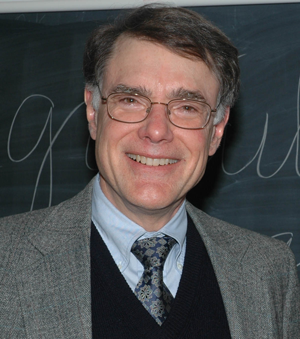The distinguished career and scientific achievements of George B. Witman, PhD, professor emeritus of radiology and inaugural holder of the George F. Booth Chair in the Basic Sciences from 1999 to 2020, will be celebrated at a virtual scientific symposium honoring him upon his retirement. The event is Wednesday, Jan. 20, from 1 to 5 p.m. The agenda includes talks focused on Dr. Witman’s areas of expertise in cilia and cilia-associated diseases.

“In addition to becoming a leader in his field of research, George has been a great, generous colleague, always willing to contribute selflessly to institutional enterprises,” said Thoru Pederson, PhD, the Vitold Arnett Professor of Cell Biology, and professor of biochemistry & molecular pharmacology, who recruited Witman from Princeton University to the Cell Biology Group of the Worcester Foundation for Biomedical Sciences in 1981. “His leadership of the M.C. Chang Distinguished Lecture Series and his collaborative role in the advent of cryo-EM at UMMS are but two of many examples.”
Witman is an international leader in the field of cell motility. His lab, which he continues to run, has been continuously funded by the National Institutes of Health for investigations of the molecular basis for diseases involving cilia and flagella. These tiny, hair-like structures found throughout the human body function to produce force and sense the environment. Ciliary defects cause numerous human diseases including respiratory disease, male infertility, polycystic kidney disease, blindness and a variety of congenital birth defects.
Witman pioneered the application of biochemical and molecular genetic approaches to the study of cilia. Throughout his career, he used these approaches to make groundbreaking insights to define the molecular composition of cilia and the function of ciliary substructures.
“George’s work had a tremendous impact on the field and led to our current understanding of the importance of cilia in human health,” said Gregory Pazour, PhD, professor of molecular medicine.
The symposium is being hosted by Dr. Pazour and Stephen King, PhD, professor of molecular, microbial and structural biology at the University of Connecticut Health Science Center, both former postdoctoral fellows in the Witman lab. They will present at the symposium along with Daniela Nicastro, PhD, professor of cell biology at the University of Texas Southwestern Medical Center; Robert Bloodgood, PhD, professor of cell biology at the University of Virginia School of Medicine; Karl Lechtreck, PhD, associate professor of cellular biology at the University of Georgia; Ritsu Kamiya, PhD, professor emeritus of biological sciences at Chuo University in Japan; and Joel Rosenbaum, PhD, professor of molecular, cellular & developmental biology at Yale University.
Registration for the Zoom event is requested.
Related stories on UMassMed News:
Gregory Pazour elected fellow of the American Society for Cell Biology
Massachusetts Facility for High-Resolution Cryo-Electron Microscopy opening at UMMS